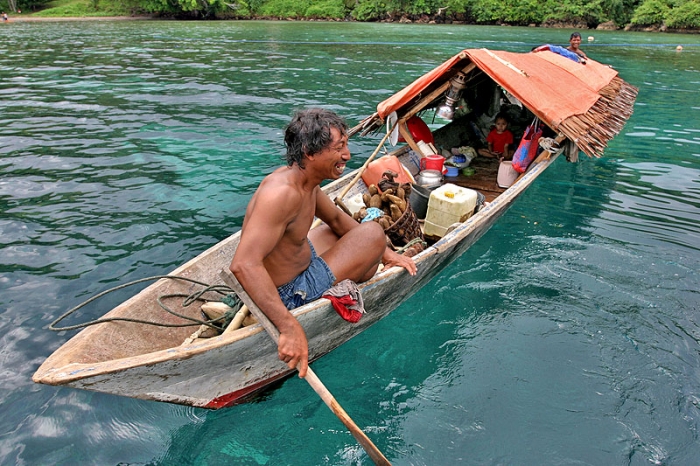Livestream
Special Interview
Video Streaming

nuke
May
Henny Purwonegoro

Welcome back to Music Corner, a musical segment which introduces you to Indonesian music, either traditional or modern one. In today’s edition, we present the songs from South Kalimantan Province.
Every region in Indonesia has their own regional songs. Some of the songs are already popular in Indonesia, such as Ampar-Ampar Pisang from South Kalimantan. The Banjar song was composed by Hamiedan AC. This song is usually sung by children in the game. Ampar Ampar Pisang can be defined as spread bananas before drying. In ancient times, banana was one of the main foods in Banjar Kingdom. Bananas are usually processed into various foods, but previously the bananas are dried first. That’s a glance about the story of the song Ampar-Ampar Pisang.
This song is quite easy to remember with a carefree rhythm. Despite having simple lyrics, this song has deep meaning and full of moral messages. In Indonesia, Saputangan Babuncu Ampat means Four Handed Sweep Handkerchief.
In the society, human relationships are always adorned with conflict. However, the conflict often causes pain. As in the lyrics "Luka nang di tangan kawa di babat, luka nang di hati hancur sakali” means Wound on the hands can be bandaged, but the wound in the heart is difficult to cure. The song also has a positive massage to forgive each other. The song ‘Saputangan Babuncu Ampat’ has lyrics of old poems or pantun. Like most old poem, it is often made to convey certain messages.
May
Do You Want To Live In My House

Let’s Speak Bahasa Indonesia, a lesson in Bahasa Indonesia or the Indonesian language on the radio, introducing some Indonesian vocabulary and guiding you to use them in a conversation.
Let's Speak Bahasa Indonesia is a collaboration between Voice Of Indonesia, RRI Foreign Broadcasting Station and the Agency for Language Development, the Ministry of Education and Culture of the Republic of Indonesia.
Today’s topic is " Kamu mau tinggal di rumahku?" or in English, “You want to stay at my place?”
Here is an example of a conversation on ‘Kamu mau tinggal di rumahku?" or in English, You want to stay at my place?”
(The Conversation is not translated, and read out slowly.The location is in Prambanan Temple area. Joko knows that Tony lives in the hotel. Therefore, Joko offers Tony to stay at his home while Tony is in Jogja.)
Joko :Kamu mau tinggal di rumahku?
Tony :Oh, apakah tidak apa-apa?
Joko :Ya, Aku senang kalau kamu tinggal di rumahku.
Bagaimana?
Tony :Oke.Kamu baik sekali.
Terima kasih.
This is the expression and vocabulary, related to the topic today, which is ‘Kamu mau tinggal di rumahku?" or in English, “You want to stay at my place?”
I will say each sentence 2 (two ) times and you may repeat after me.
|
Kamu mau tinggal di rumahku? |
(2X) In English |
You want to stay at my home? |
|
Apakah tidak apa-apa? |
(2X) In English |
Is it okay? |
|
Aku senang kalau kamu tinggal di rumahku. |
(2X) In English |
I'll be glad if you want to stay at my home. |
|
Bagaimana? |
(2X) In English |
How? (What do you think?) |
|
Kamu baik sekali. |
(2X) In English |
You are very kind. |
To offer someoneto stay at your home, you say: ‘Kamu mau tinggal di rumahku?”(2X) which means "You want to stay at my place?" or in a full sentence, “Apakah kamu mau tinggal di rumahku?”(2X) which means "Do you want to stay at my place?".
If you accept the offer, you can simply say "Oke”, (2X) which means “Okay”. "Ya , saya mau” (2X) which means “Yes, I do”. “Baiklah” (2X) which means “Alright”, or “Tentu saja” (2X) which means "Of course"
But if you refuse, you can answer “Maaf, tidak bisa”(2X) which means "Sorry, can not" " or to refuse subtly in accordance with the context of the conversation, consider the following example.
- “Kamu mau tinggal di rumahku?” (2X) which means"You want to stay at my place?".
- “Saya mau, tetapi tidak bisa.” (2X) which means.”I do, but can not” or:
- “Maaf sekali ya, terima kasih.” (2X) which means "I'm so sorry, I can’t. Thanks anyway”
For practice send your voice recording in bahasa Indonesia to email address at This email address is being protected from spambots. You need JavaScript enabled to view it. . There will be an attractive prize for selected senders.
The exercise is to describe a tourist spot in your country by mentioning the name of the country, the name of the tourist spot, the location and the weather in that place. If you want to provide more information, please do. Example:
Selamat pagi, negara saya Indonesia, memiliki tempat wisata Candi Prambanan yang terletak di Jogyakarta.Cuaca sekitar Candi Prambanan panas . Gudeg adalah makanan khas Jogyakarta.
May
TODAY IN HISTORY

Welcome back to Today in History, a daily segment which brings back people and events from this date in the past as recorded in history.
We’ll start with May 8, 1945 Winston Churchill announced the end of the War in Europe.
In a radio-broadcast speech from Downing Street, British Prime Minister Winston Churchill urged the British people to rejoice, but not to forget the hard work and the efforts to be made for the future. King George VI also gave a speech, broadcast from Buckingham Palace which was damaged by bombs. In his speech the King thanked his people. Both speakers reminded listeners that Japan had not been beaten yet.
Next event is that May 8, 1948 is establsihment of the first World Red Cross Day.
Every year since 1948, May 8 has been celebrated as World Red Cross Day to appreciate the services of the founder of the World Red Cross Movement, Henry Dunant, who was also born on the same date. The World Red Cross Day commemoration aims to inspire, facilitate and promote all humanitarian activities undertaken by the International Committee of the Red Cross and members of the participating National Community. In addition, it is also used as an opportunity to appreciate the services of volunteers and staff who are struggling to save the lives of many people.
Last event of Today in History is that on May 8, 1993 was the death of Marsinah, an Indonesian labor activist.
Before her body was found on May 9, 1993 in Jegong Village, Wilangan Nganjuk District, East Java, Marsinah was one of the employees of PT. Catur Putera Surya, who was very active in demanding a more decent wage. Marsinah along with other workers, went on strike to call their demands. Until May 5, 1993, Marsinah was still active with her colleagues in demonstrations and talks. However, on the following days, Marsinah's whereabout was not known by her colleagues until her body was found on May 9, 1993. Marsinah was declared dead on May 8, 1993. Autopsy results conducted by doctors at Nganjuk Regional General Hospital concluded that Marsinah died as a result of persecution. As an activist Marsinah earned the Yap Thiam Hien Award in 1993, for her sevice in upholding human rights.
May

Bajo is an inseparable ethnicity with the sea. Bajo community residence is very unique; most of their houses are built on the water. In the past, they even lived in boats or Lepa. Currently, Bajo people have spread throughout the archipelago, mostly in Sulawesi. There is one tradition of fishing that Bajo community usually does, which requires them to travel long distances. The tradition is called Bapongka. Bapongka is a Bajo community tradition that uses traditional equipment and keeps the marine environment from damage.
Bapongka is sailing tradition for a living survive or to get sea products to another region or province, for several weeks and even months. They went to sea in groups. Each group consists of three to five boats, each boat consists of one person. The formation of small group of Bapongka is done based on closeness. Usually the small group will meet each other in a fishing location then form a large group consist of 15 or even 20 boats.
The traditional boat called ‘lepa’, which is equipped with outrigger and roof made of sago leaves. Generally the boats are run with oars, although the boats are now equipped katinting machine. During the fishermen perform Bapongka, they brought quite a lot of foodstuffs such as sago and some equipments, such as petromax lamps, water containers, cooking and eating utensils, sleeping gear, and catching equipment for sea cucumbers and other marine products.
Bapongka tradition has a good impact for marine conservation, especially coral reef, because it only using simple equipment. In performing the Bapongka tradition, Bajo community have some taboos that must be obeyed. The prohibition for Bajo people is believed to affecting the catch, such as not to throw something at sea when doing Bapongka. They should not dispose rice washing water, cooking charcoal, coffee grounds, chilli water, ginger water, orange peel, kitchen ash into the sea. When washing the rice, the water put on the boat, and will be shed after approaching the mainland. Likewise with wood charcoal used cooking, ash kitchen, orange peel, chili water and ginger water.
The simplicity of boats and equipments as well as the prohibitions that should not be violated because it is believed to be a disaster. While, Bajo community also believe the sea has a ruler in the form of spirit, called Mbo. All things make the Bapongka tradition of Bajo community highly appreciate and preserve the nature, as their local wisdom.
